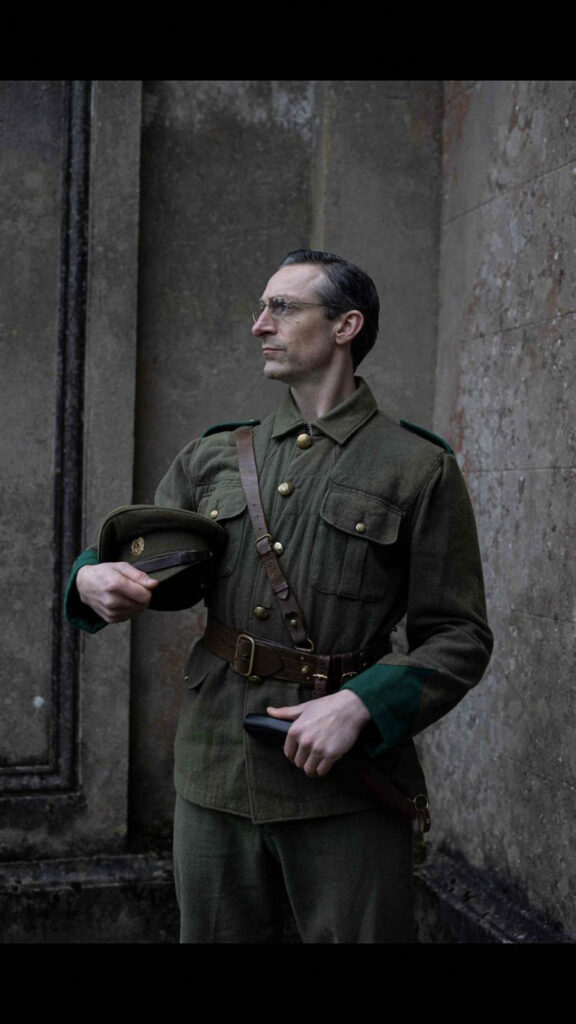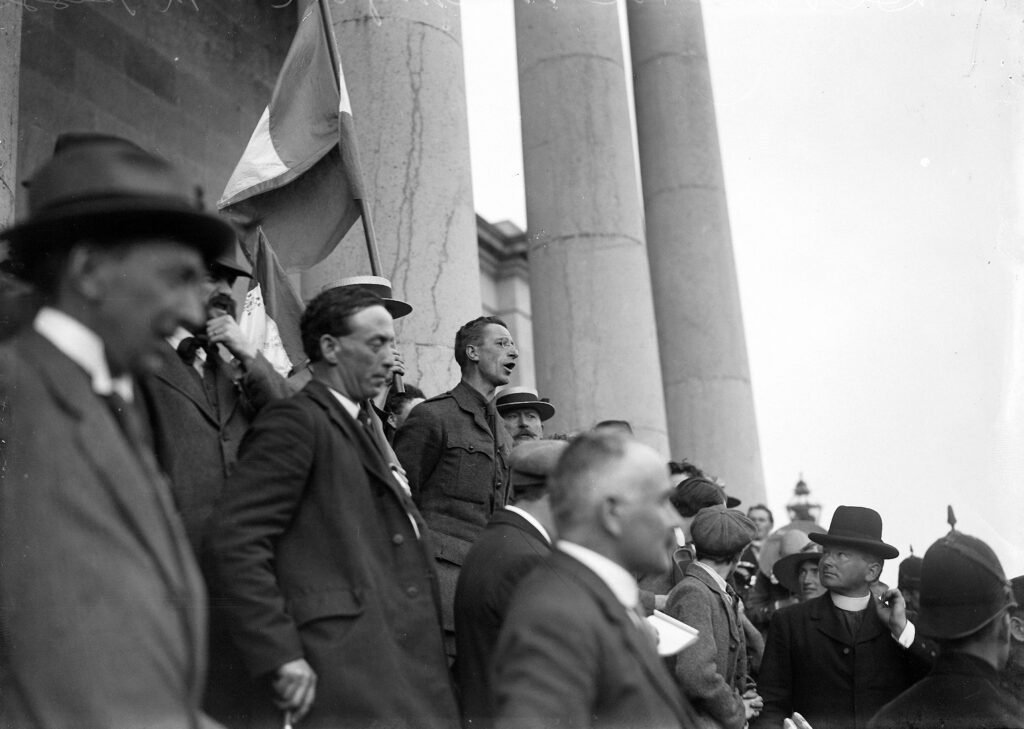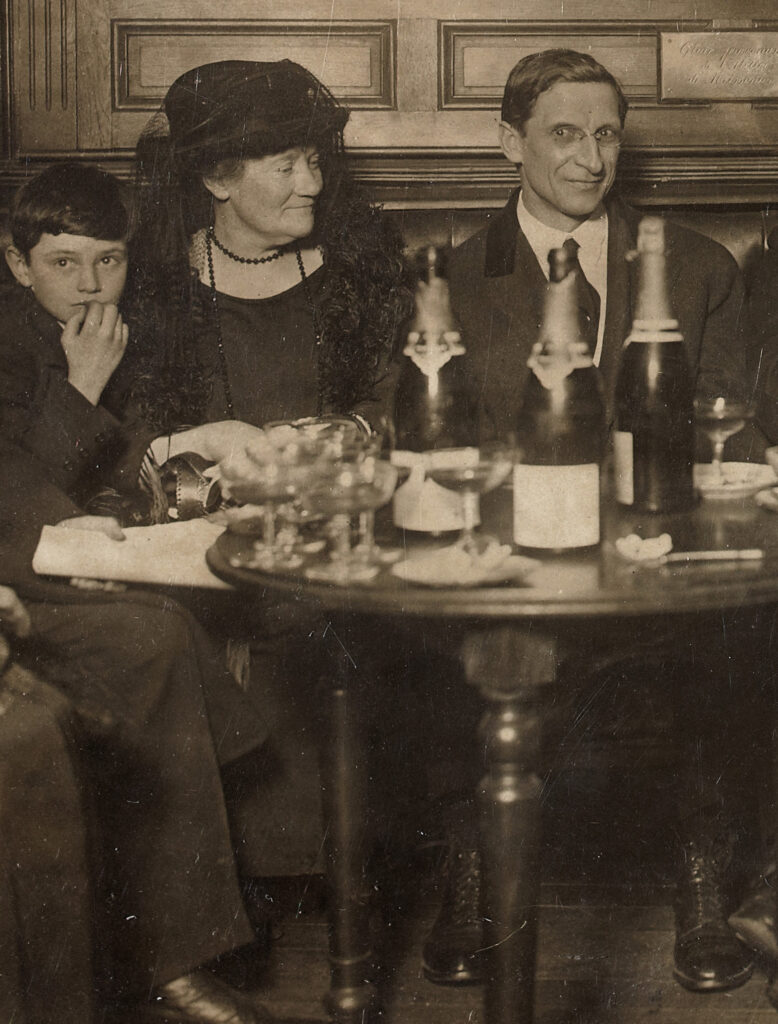TG4, 22 & 29 January 2025
By Sylvie Kleinman

This two-part documentary hypes up the ‘drama’ of Éamon de Valera versus the ‘radical revolutionary women activists’ who had supported him during his so-called wilderness years (c. 1924–6) but were then betrayed when he entered the Free State legislature and rose to become the iconic embodiment of an arch-conservative Ireland. We wrongly anticipated that De Valera San Fhasách would break from ‘great men’ history and constructively blend into Dev’s pantheonic status this now well-documented dimension to post-Rising history. Many republican women broke from his ranks in 1927 as he and 43 Fianna Fáil TDs signed the oath of fidelity to the British sovereign, ‘an empty formality’. Unforgivable was the encoding from above in the 1937 Constitution of prevailing arch-conservative family values (and not only in Ireland’s theocracy), a landmark which still resonates today, if not reflecting our social norms.
Dev’s discovery of leadership when commanding in 1916, election in 1917, rise to political positions, international notoriety and eventual presidency of the Dáil in April 1919 are well recounted and increasingly swelled his capacity to shape Ireland’s future. Then his rejection of the Treaty and his stance during the Civil War had fuelled the expectations of these women (only women?) that he would endeavour to achieve the republican vision. But the ideology of the 1916 Proclamation was not upheld, and women were not free in a free Ireland, not the republic of ‘gender and class’ equality (our emphasis) that many had died for.

Over two drawn-out episodes, the main landmarks in Dev’s trajectory c. 1916 to 1937 are recalled, and key episodes reconstructed by costumed actors. These scenes are often engaging, probably wisely are silent, but lose their impact when repeated: we become confused as to what they signify or depict. The template is old school: historians interviewed against a neutral backdrop rather than relevant or interesting locations, their chopped statements validating a simplistic and mostly intellectually undemanding narrative. It is time documentary-makers involved the ‘experts’ in shaping a more robust script: the public can handle a bit more of lateral, nuanced thinking. Viewers repeatedly see way too many interviewees, and what they say often lacks depth. Visually all this is relatively well documented with contemporary images, but a major weakness is the absence of general and direct insights into the dynamics of Dev’s interactions with these radical women, potted histories of their activism, or examples of their mind-sets beyond being ‘doctrinaire republicans’ or feminists. There are virtually no quotes from their written exchanges with Dev, or their own public statements. Logically it’s asymmetrical, but there are also no influencing or dissenting male voices, on either side.
For the Irish Times (22 January 2025), this production was ‘clumsy’ and relegated the women to ‘walk-on parts’, a view supported here. The actor Marcus Lamb is effective in representing Dev’s growing leadership but appears a bit too sweet to be authoritative, and the juxtaposition of photos with actresses playing a handful of his female counterparts is indeed often gauche. We see Constance Markievicz (remarkably neat, with her hat on straight), Kathleen Clarke and far less-known but pivotal figures such as Dorothy MacArdle and the formidable but ‘obstinate’ Mary MacSwiney (exaggeratedly frumpy). The latter’s stance after experiencing the trauma of her brother Terence’s death in jail on hunger strike in 1920 is sharply summarised and contextualised by Leeann Lane. Already the biographer of MacArdle, Lane’s forthcoming book on MacSwiney will layer what has been packaged as one-dimensional uncompromising republicanism. But this production did not remind us that MacSwiney was a TD, nor reference her protracted anti-Treaty speech nor her own imprisonment. It does not allow these women to speak for themselves, in their own words, namely at two critical junctures in this underdeveloped story. These are March 1926, when Dev informed the Sinn Féin Árd Fheis that he would overcome abstentionism and enter the Dáil if the oath was abolished but resigned as president when this was rejected. Promptly founding Fianna Fáil and leading them into electoral victories, he then lost the support of key women. Clarke refused to withdraw from her Seanad nomination, but prevailed. The women, some with a democratic mandate as TDs, become mere props as furies or firebrands in what ends up as Dev’s story. How and why Kathleen Lynn, Dev’s high regard for her and the blunt but contemporary insights from her diary were overlooked is perplexing. Self-evidently, the release of the draft Constitution in the spring of 1937 provoked even an international reaction from women. We should have seen or heard on-screen quotes from Hannah Sheehy-Skeffington’s stark public statements, and learned more about the quality and impact of MacArdle’s written ‘propaganda’. The exclusion of women from juries meant that they were also denied trial by their peers, but the (clear) explanation by 21st-century historians was not enhanced by examples of contemporary rhetoric or protest, nor by relevant illustrations.

At the end, fundamental issues such as class and the effects of trauma and gender violence were alluded to, projecting compelling themes which merit their own story. How and when these women (many of them college-educated like Dev) had been agitating for a republic of class equality we don’t know, as employment legislation is flagged but the labour movement is missing in action. The voice-over attributed the failure to achieve this equality to the fact Dev had ‘been in charge for so long’. While not denying his ‘towering’ stature, the monomythic Dev here operates in a vacuum without male colleagues, advisers or opponents, nor indeed lamenting the loss of fallen comrades or taking their place. He had been well surrounded, namely by a loquacious Catholic hierarchy, when enshrining in constitutional law in 1937 the pillars of marriage, family and female domesticity, or ‘the kind of society Ireland had at the time’. Finally, we had heard of his sorrowful time in prison and weak mental health, yet astonishingly not a single word about his wife and children on the outside. To gain a better understanding of his interaction with engaged and enterprising females, inevitable encounters during his generation that had witnessed their unprecedented presence in the public sphere, one would have welcomed a minute, or even two, about the character of his wife, Sinéad, and the dynamic of their marriage. She is neither mentioned nor depicted, a mystifying oversight in a production not without merit but which fails to engage with our expectations of how richly contextualised history is packaged for the public today.
Sylvie Kleinman is Visiting Research Fellow at the Department of History, Trinity College, Dublin.
